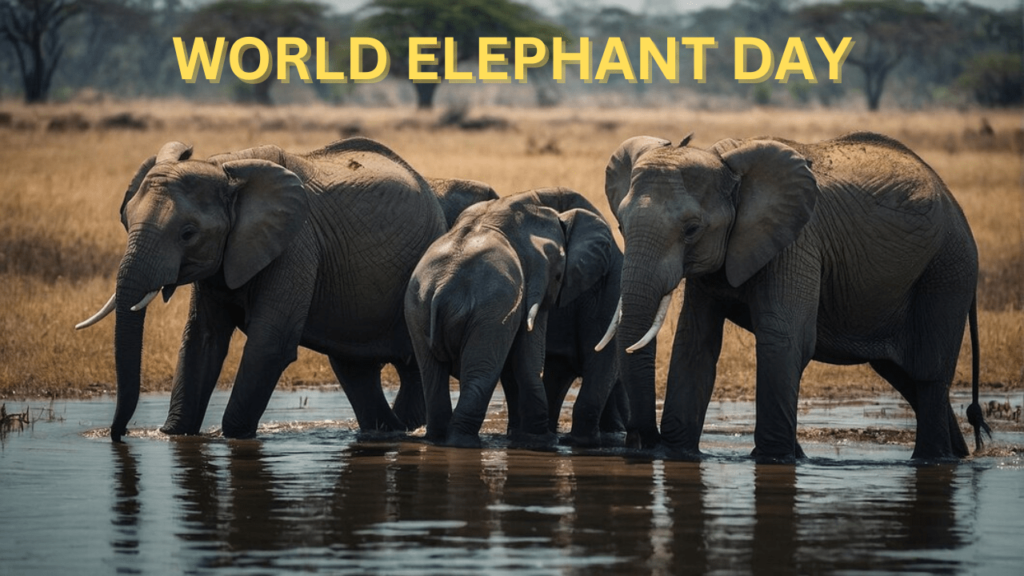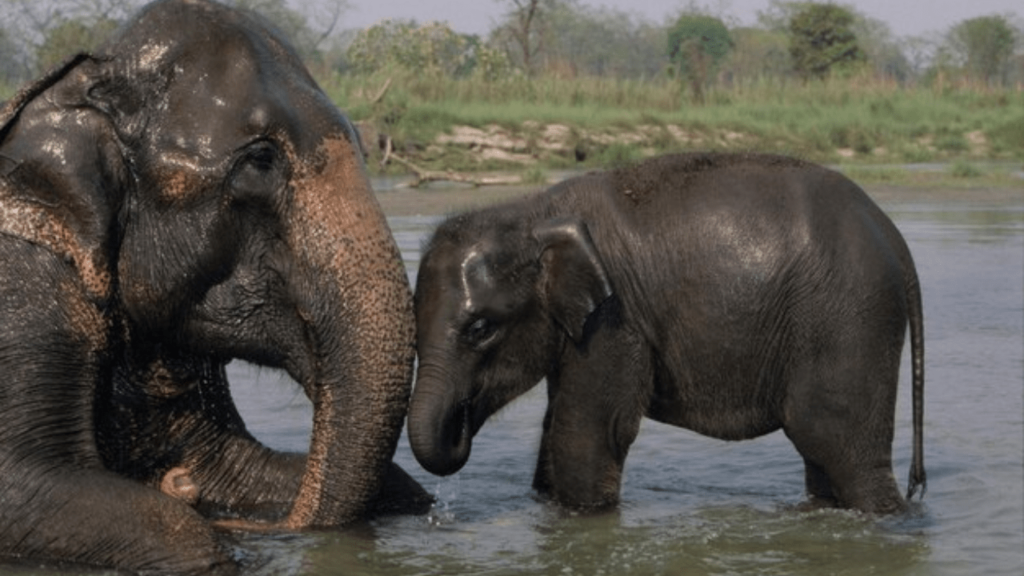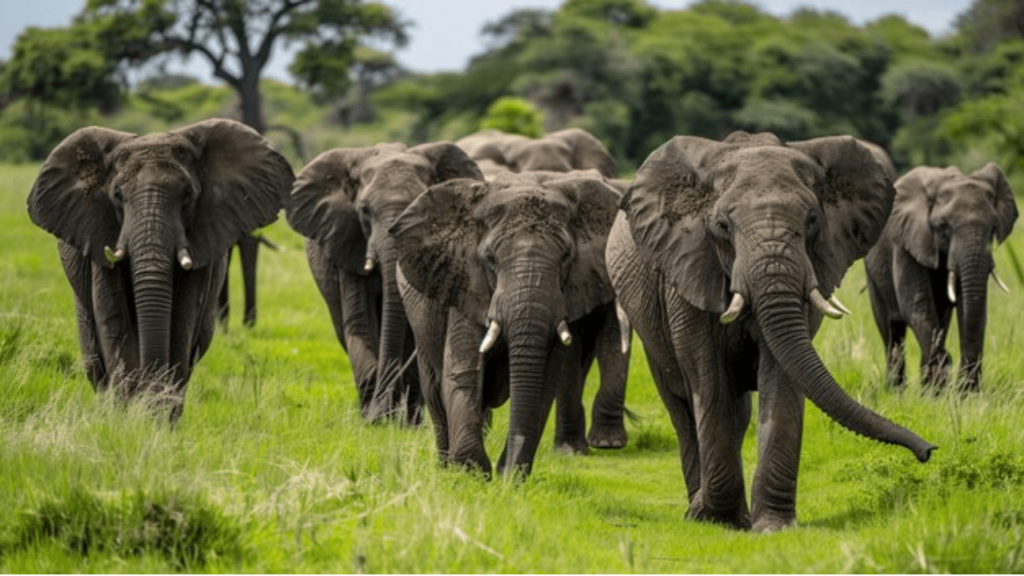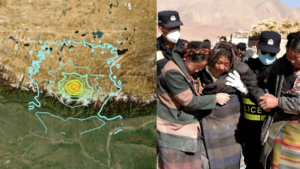World Elephant Day 2024 is a time to reflect on the importance of elephants in maintaining the balance of our ecosystems and the urgent need to protect them from the threats posed by the ivory trade. Join us in celebrating this day by learning more about these incredible animals and how you can help preserve their future.

World Elephant Day 2024 is a global event dedicated to the preservation and protection of the world’s elephants. As we mark this important day, it’s crucial to reflect on the vital role elephants play in maintaining the balance of our ecosystems and the grave threats they face due to the illegal ivory trade. Elephants are not only majestic creatures but also keystone species that support the health of their environments. However, their survival is increasingly jeopardized by poaching and habitat loss, making the fight for their protection more urgent than ever.
Elephants as Keystone Species
Elephants are often described as a keystone species, meaning their presence and activities have a disproportionately large impact on their environment. Keystone species are crucial for the stability and diversity of their ecosystems. The removal of such species can lead to a cascade of effects that disrupt the entire ecosystem.
In the case of elephants, their feeding habits, migration patterns, and social structures all contribute to shaping the landscapes they inhabit. For instance, by uprooting trees and trampling vegetation, elephants create clearings in forests and woodlands, which allows sunlight to reach the forest floor. This process promotes the growth of new plants and creates habitats for smaller species, thus increasing biodiversity.
Elephants as Seed Dispersers
One of the most vital roles elephants play is in seed dispersal. Many tree species rely on elephants to disperse their seeds. As elephants consume vast amounts of vegetation, they ingest seeds along with the foliage. These seeds are then transported over long distances and eventually deposited in the elephants’ dung. This natural fertilization process gives the seeds a better chance of germinating and growing into new plants.
In fact, some plant species have evolved to depend almost exclusively on elephants for their seed dispersal. Without elephants, these species would struggle to survive, leading to a decline in plant diversity and, consequently, the animals that rely on those plants for food and shelter.
Water Resource Management
Elephants are also instrumental in water resource management within their habitats. During the dry season, elephants use their tusks to dig into dry riverbeds to access underground water sources. These water holes, dug by elephants, not only provide them with water but also serve as vital sources of hydration for other animals in the ecosystem.
In addition, elephants’ movements across the landscape help maintain the flow of water in rivers and wetlands. By trampling vegetation and creating paths, they prevent the overgrowth of plants that could otherwise choke water bodies, ensuring that water remains accessible to a variety of species.

Elephants and Forest Structure
In forest ecosystems, elephants play a critical role in maintaining the structure and diversity of the forest. Their feeding habits help to control the growth of certain plant species, preventing them from becoming too dominant. This allows a greater variety of plant species to thrive, which in turn supports a more diverse range of animals.
Moreover, elephants contribute to the creation of “elephant paths” through dense forests. These paths, created as elephants move through their habitats, are used by other animals as well. This network of trails facilitates movement and access to resources, contributing to the overall connectivity of the ecosystem.
Elephants and Climate Regulation
Elephants indirectly contribute to climate regulation through their impact on vegetation. By maintaining a balance in plant growth, they help regulate the carbon cycle. Forests and woodlands play a crucial role in absorbing carbon dioxide from the atmosphere, and the presence of elephants ensures these ecosystems remain healthy and productive.
In African savannas, for example, elephants’ activities in thinning out trees and promoting grassland growth can influence the amount of carbon stored in the soil. Healthy grasslands sequester significant amounts of carbon, helping to mitigate the effects of climate change.
The Social Structure and Cultural Importance of Elephants
Beyond their ecological roles, elephants have a profound social structure that reflects their intelligence and deep emotional capacity. Elephant herds follow a matriarchal structure, with the elder females in charge. These matriarchs pass down knowledge of migration routes, water sources, and survival strategies to younger generations, ensuring the continuity of their species.
Elephants are also known for their strong social bonds and emotional depth. They display behaviors such as mourning their dead, showing empathy, and forming lifelong friendships. These behaviors not only highlight the complexity of elephant societies but also underscore the moral imperative to protect them.
In many cultures, elephants hold significant cultural and spiritual value. They are revered in religions like Hinduism and Buddhism and are often symbols of strength, wisdom, and longevity. This cultural importance adds another layer of urgency to the need for their protection.

The Threat of the Ivory Trade: A Grim Reality
The Ivory Trade: A Historical Overview
The ivory trade has a long and dark history, dating back centuries. Ivory, derived from elephant tusks, has been prized for its beauty, durability, and rarity. It has been used to create a variety of objects, from jewelry and ornaments to religious artifacts and piano keys. This demand for ivory has driven the slaughter of elephants on a massive scale.
During the colonial era, the ivory trade reached its peak, with European powers exploiting Africa’s resources, including its elephants, to satisfy global demand. The consequences of this exploitation were devastating, leading to drastic declines in elephant populations across the continent.
The Modern Ivory Trade: Persistent Threats
Despite international efforts to ban the ivory trade, illegal poaching remains a significant threat to elephant populations. The Convention on International Trade in Endangered Species of Wild Fauna and Flora (CITES) implemented a ban on the international trade of ivory in 1989. However, illegal trade has persisted, driven by black markets and high demand, particularly in Asia.
Poachers often target the largest elephants, as their tusks yield the most ivory. This selective hunting has led to a concerning trend known as “tusklessness,” where elephants evolve to have smaller or no tusks. While this may seem like a natural defense mechanism, it has long-term genetic consequences for the species.
Impact on Elephant Populations
The impact of the ivory trade on elephant populations has been catastrophic. African elephant populations have plummeted from millions in the early 20th century to just around 415,000 today. In some regions, such as West Africa, certain elephant populations are on the brink of extinction.
The loss of elephants due to poaching has profound ecological repercussions. As keystone species, their decline disrupts the balance of ecosystems, leading to cascading effects that harm other species and habitats. The loss of even a single elephant can have a ripple effect, affecting the entire ecosystem they support.
The Human Cost of the Ivory Trade
The ivory trade not only affects elephants but also has a significant human toll. Poaching is often linked to organized crime, armed militias, and terrorism. The profits from illegal ivory sales are frequently used to fund conflicts and insurgencies, particularly in parts of Africa. This connection between the ivory trade and violence exacerbates instability in already vulnerable regions.
Moreover, the loss of elephants can have economic consequences for communities that rely on wildlife tourism. Elephants are a major attraction for tourists, and their presence supports local economies. The decline in elephant populations due to poaching can lead to a decrease in tourism revenue, further impoverishing communities.

Global Efforts to Combat the Ivory Trade
In recent years, there has been a renewed global effort to combat the ivory trade. Governments, NGOs, and conservationists have worked together to strengthen anti-poaching laws, increase penalties for illegal trade, and raise awareness about the importance of elephant conservation.
One significant development has been the destruction of ivory stockpiles. Countries like Kenya, the United States, and China have publicly destroyed seized ivory to send a strong message against the trade. These events are symbolic but also aim to reduce the demand for ivory by demonstrating that it has no value outside of the living elephant.
Another key strategy has been to target demand, particularly in Asia, where ivory is still highly valued. Campaigns to change consumer behavior, coupled with stricter regulations on ivory sales, have shown some success in reducing demand. However, the fight against the ivory trade is far from over, and continuous efforts are needed to protect elephants.
The Importance of Technology in Anti-Poaching Initiatives
Technology has become an essential tool in the fight against poaching and the ivory trade. Conservationists are increasingly using drones, GPS tracking, and artificial intelligence to monitor elephant populations and detect poaching activities.
Drones, for example, provide real-time surveillance of vast and remote areas, allowing rangers to respond quickly to poaching incidents. GPS collars fitted on elephants help track their movements, providing data that can predict and prevent potential poaching hotspots.
In addition, AI-powered systems are being used to analyze data from camera traps, sensors, and other monitoring devices. These systems can identify poaching patterns and predict where poaching is likely to occur, enabling preemptive actions to protect elephants.
Community Involvement in Conservation
While technology is a powerful tool, community involvement is equally important in elephant conservation. Local communities often live in close proximity to elephant habitats and are directly affected by human-elephant conflicts and poaching.
Community-based conservation programs that involve local people in protecting elephants have proven to be effective. These programs provide education about the importance of elephants and offer alternative livelihoods to poaching, such as ecotourism, beekeeping, or sustainable agriculture.
By involving communities in conservation efforts, these programs foster a sense of ownership and responsibility toward elephant protection. Additionally, they help to mitigate human-elephant conflicts by promoting coexistence strategies, such as the use of beehive fences or chili-based deterrents to keep elephants away from crops.

The Future of Elephants: A Call to Action
The survival of elephants is not just a conservation issue; it is a moral imperative. These intelligent and social creatures are an integral part of our world’s natural heritage. Their loss would not only diminish the biodiversity of our planet but also strip away a part of our shared human experience.
To ensure the survival of elephants, we must continue to fight against the ivory trade, protect their habitats, and support conservation efforts. This requires a global commitment from governments, organizations, and individuals alike. Everyone has a role to play, whether through advocacy, donations, responsible tourism, or simply spreading awareness about the importance of elephants.
How You Can Help
There are several ways you can contribute to the protection of elephants:
- Support Organizations: Donate to or volunteer with organizations dedicated to elephant conservation, such as the World Wildlife Fund (WWF), the Elephant Crisis Fund, or the David Sheldrick Wildlife Trust.
- Advocate for Change: Use your voice to advocate for stronger anti-poaching laws and the closure of domestic ivory markets. Support petitions and campaigns aimed at protecting elephants.
- Choose Sustainable Tourism: When visiting elephant habitats, choose ethical and responsible tour operators who do not exploit elephants for entertainment. Avoid attractions that involve elephant rides or performances.
- Educate Others: Spread awareness about the importance of elephants and the threats they face. Share articles, documentaries, and other resources with your network to help others understand the urgency of elephant conservation.
- Reduce Demand: Refuse to buy products made from ivory or other elephant parts. Encourage others to do the same and educate them about the impact of their choices.
Looking Forward
Elephants are more than just a symbol of the wild; they are a cornerstone of their ecosystems and a testament to the richness of our natural world. Their survival is critical not only for maintaining biodiversity but also for preserving the balance of life on Earth. However, the threat of the ivory trade looms large, endangering these majestic creatures and the ecosystems they support.
As we celebrate World Elephant Day, let us remember that the fight to save elephants is far from over. It is a cause that requires our collective effort, from supporting conservation initiatives to advocating for stronger protections. By taking action, we can ensure that elephants continue to roam the wild, playing their vital role in our planet’s ecosystems for generations to come.
Read Next:

The Psychology of Love: Why Valentines Day Matters More Epic Than You Think
Discover the psychology of love and why Valentines Day is more important than you think. Learn how love impacts the brain, strengthens relationships, and boosts

Premier League Highlights: Arsenal Humiliate Man City 5-1, Spurs and Palace Secure Crucial Wins
Arsenal demolished Manchester City 5-1 in a statement premier league highlights win, reigniting their title hopes. Meanwhile, Crystal Palace stunned Man United 2-0, and Tottenham

How Budget 2025 Impacts the Indian Middle-Class: Major Tax Benefits and Glaring Omissions
Budget 2025 offers major tax relief to the middle class, including zero tax on incomes up to ₹12 lakh. However, it misses out on incentives

Degrees vs Employability: Why “Highly Qualified Degree Holders” Struggle to Find Jobs While “Less Qualified Individuals” Get Hired Faster!
Many highly qualified individuals struggle to secure jobs, while less qualified candidates get hired quickly. This Degrees vs Employability paradox is caused by employer preferences,

The Power of Mindset: Why Looking Poor Doesn’t Make You Poor, but Thinking Poor Does!
Discover why looking poor doesn’t define your wealth but thinking poor does. Learn the power of mindset and how a growth-oriented mindset can lead to

Overthinking: How It’s Damaging Today’s Youth – Causes and Cure in 2025
Understanding how overthinking is silently damaging today’s youth, from its causes rooted in societal pressure and social media to its long-term effects on mental health.

Netaji Subhash Chandra Bose: An Epitome of Epic Leadership
Discovering the incredible life of Netaji Subhash Chandra Bose, a leader whose vision, courage, and determination redefined India’s freedom struggle. Explore his leadership qualities, ideology,

Global News Headlines Today: From Gaza Ceasefire to Blue Origin’s Massive 2025 Milestone
Explore today’s top global news headlines, from the Gaza ceasefire and Blue Origin’s historic spaceflight to Apple losing its top spot in China’s smartphone market.

The Hidden Danger of Social Media Nudity: A Threat to Today’s Youth in 2025
Understanding how social media nudity is impacting the youth and their future potential. Learn about the risks of unregulated content, cultural sensitivities, and solutions for

FA Cup 2024: Manchester United Survive Arsenal Test to Advance in FA Cup Fourth Round
Manchester United defeated Arsenal in a thrilling FA Cup third-round encounter, with Atlay Bayindir’s heroics sealing the win. Read about key moments, standout performances, and

Supercopa de España: Barcelona Dominate Real Madrid 5-2 to Claim Supercup
Barcelona delivered a stunning 5-2 victory over Real Madrid in the Supercopa de España final. Read about the key moments, star players, and the significance

Global News Highlights Today: India’s Metro Milestone, US Aid Shift, iOS Stunning Updates and More!
Explore today’s global news highlights, including the Tibet earthquake, political tensions in South Korea, LA wildfires, US aid shifts, and India’s metro milestone. Stay informed

The Power of Keeping Plans Private in 2025: Why Silence is the Key to Achieving Your Dreams!
Discover why keeping plans private is crucial for achieving your dreams. Learn how silence boosts focus, protects momentum, and helps you achieve success without distractions

Rolls-Royce Ghost Series II Arrives in India 2025: Elegance Meets Stunning Innovation
Discover the all-new Rolls-Royce Ghost Series II launched in India, priced from ₹8.95 crore. Explore its stunning design, luxurious interior, enhanced tech features, and powerful

Global News Highlights: Earthquakes in Tibet, US Bird Flu Crisis Fatality, Brics Welcomes Indonesia in 2025, and Many more
Explore this week’s global news highlights, including the first bird flu death in the US, Indonesia joining Brics, devastating earthquakes in Tibet, rising HMPV cases

Global News Highlights: From New Orleans Tragedy to Energy Crisis, Key Stories to Start 2025
Start 2025 with a comprehensive look at global news highlights. From the New Orleans attack to Israel’s airstrikes and South Korea’s aviation tragedy, explore the

A Tribute to Dr. Manmohan Singh: India’s 13th Prime Minister and Economic Visionary
Explore the life and legacy of Dr. Manmohan Singh, India’s 13th Prime Minister, celebrated economist, and architect of economic reforms. A tribute to his unparalleled

Boxing Day Premier League Highlights: Fulham Stun Chelsea 2-1, Liverpool Extend Massive Lead
Relive the Boxing Day Premier League action with key highlights, including Liverpool’s comeback win, Fulham’s late drama, and Newcastle’s dominant victory. The Premier League returned

The Top 7 Best-Selling Bikes of December 2024: Revving up the Roads
Here are the top 7 best-selling bikes of December 2024! The Indian motorcycle market showcased a mix of performance, style, and practicality, appealing to a

7 Winter Superfoods to Keep You Fit and Boost Your Immunity This Season
Discover 7 powerful winter superfoods that can boost your fitness and immunity naturally. Learn how these nutrient-packed foods keep you healthy, energized, and resilient during
